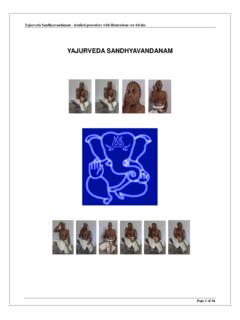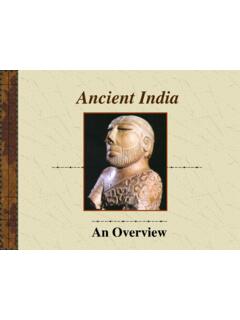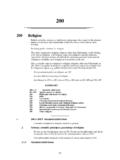Transcription of 14 Slokas and Special Slokas for each separate day of the ...
1 14 Slokas and Special Slokas for each separate day of the week as pdf file Sloka is a term derived from Sanskrit. Sloka is a verse, phrase, proverb or hymn of praise dedicated to the God. Shlokas are usually composed in a specific meter. Sloka is a verse of two lines, each of sixteen syllables. Sloka usually forms the part of hindu prayers. Shloka can also be attributed to specific gods and goddesses . What is Sloka Sloka is a powerful prayer which conveys the dignity and the omnipotence of God. Sanskrit Shlokas describe God in different forms and their celestial powers.
2 People, who sincerely recite these verses and invoke the God mentally, attain a steady and peaceful mind. Shloka forms the part of ''Stotras'' which are dedicated to gods as prayers. Slokas are the primary verses from Mahabharata and Ramayana, the great epics of Indian Mythology. In this section, we are covering the following Slokas : Bedtime Sloka | Bhagavad Gita Slokas | Durga Sloka | Early Morning Sloka | Ganesh Sloka | Holy Bath Sloka | Krishna Sloka | Parvati Sloka | Rama Sloka | Saraswati Sloka | Shiva Sloka | Sloka While Eating | Sloka While Lighting Lamp | Vishnu Sloka 1.
3 Bedtime Sloka Bedtime is the time when people want to relax themselves after the long hectic schedules of the day. It is considerable to remember God at such time. Following Bedtime Sloka / Shloka is a bedtime prayer of the Hindus. "Karacharana Krn Itam Vaakkaayajam Karmajam Vaa, Shravananayanajam Vaa Maanasam Vaaparaadham, Vihitamavihitam Vaa Sarvametatkshamasva, Jaya Jaya Karunaabdhe Shriimahaadeva Shambho". Meaning: The literal meaning of the mantra is: "O God, kindly pardon my incorrect actions done consciously or unconsciously, either through my organs of action (hand, feet, and speech) or through my organs of perception (eyes, ears) or by my mind.
4 I adore the God, who is the ocean of kindness". Significance: By God's grace, we have completed one more day of our life. So, in order to thank god and to ask for his mercy, one can recite this Sloka. This bedtime Sloka is a prayer to God asking him to excuse our mistakes and maintain his mercy on us. 2. Bhagavad Gita Slokas Slokas are verses in the praise of God. Shlokas from Bhagwad Gita are renowned for their massive power. Gita Slokas bring the idea of spirituality to our mind. Slokas of Bhagavad Gita can be recited in order to get the peace of mind.
5 Daily chant of these Slokas , with their meanings kept in the mind, makes the person aware about the fact of material world and the celestial world. Gita Slokas tell about the eternal divine world which is pure and serene. These Slokas make the person realize the purpose, for what he/she has come in this world. Following are some of the Slokas from Bhagavad Gita with their meanings: "Cancalam Hi Manah Krsna Pramathi Balavaddrdham Tasyaham Nigraham Manye Vayoriva Suduskaram". This Sloka states that the Individual self is the traveler in the chariot of the material body and the intelligence is the driver.
6 Mind is the driving instrument and the senses are the horses. Thus, the self is the enjoyer or sufferer in the relationship of the mind and senses. "Balam Balavatam Caham Kamaragavivarjitam Dharmaviruddho Bhutesu Kamo'smi Bharatarsabha". The Sloka says that God is detached and passionless strength of the dominant and the virtuous craving in men. "Ye Caiva Sattvika Bhava Rajasastamasasca Ye Matta Everti Tanviddhi Na Tvaham Tesu Temayi". This Shloka tells that God is the only source of all good (satva), obsessive (rajas) and dark (tamas). elements still, they are not within the God nor the deity is within them.
7 "Tribhirgunamayairbhavairebhih Sarvamidam Jagat Mohitam Nabhijanati Mamebhyah Paramavyayam". This Sloka states that the whole world is engrossed in the three elements of Satva, Raja, and Tama .This is the reason, people don't recognize the Eternal God who is beyond them. "Daivi Hyesa Gunamayi Mama Maya Duratyaya Mameva Ye Prapadyante Mayametam Taranti Te". The Shloka states that the celestial maya of God with its threefold attributes is very complex. Yet, those who worship God are able to conquer it. "Na Mam Duskrtino Mudhah Prapadyante Naradhamah Mayayapahrtajnana Asuram Bhavamasritah".
8 This Shloka says that people who are attracted by maya of God lose their mind. They get fascinated by the baser impulses and stop worshipping God. These people are stupid and evil who don't even understand that all these things are part of the web created by the Almighty. "Caturvidha Bhajante Mam Janah Sukrtino'rjuna Arto Jijnasurartharthi Jnani Ca Bharatarsabha". This Sloka says that there are four kinds of good people who worship god, those who desire earthly gains, those who are suffering, those who seek knowledge and those who possess wisdom.
9 "Tesam Jnani Nityayukta Ekabhaktirvisisyate Priyo Hi Jnanino'tyarthamaham Sa Ca Mama Priyah". This Shloka tells that out of the devotees, there are some wise people who want something in return and the people who don't expect any fruit in return of the worship. God loves the people who don't expect anything in return as their love towards the god is true. "Udarah Sarva Evaite, Jnani Tvatmaiva Me Matam Asthitah Sa Hi Yuktatma Mamevanuttamam Gatim". This Sloka states that all those who worship God are commendable. But the outstanding devotees, who worship God with the single motive to merge in the God, are the true devotees who have achieved the highest aim of life.
10 3. Durga Sloka Durga symbolizes the power of the Supreme Being that maintains moral order and justice in the universe. Durga is also known as "Shakti". Worship of the goddess Shakti is very popular among the hindu people. Durga stands for the unified symbol of all divine forces; Strength, Morality, Power, Protector. Slokas on Goddess Durga form the part of prayers offered to the goddess. Durga (Devi). Shlokas / Slokas are as follows: "Yaa Devii Sarvabhuuteshhu Maatrirupena Sansthitah Yaa Devii Sarvabhuuteshhu Shaktirupena Sansthitah Yaa Devii Sarvabhuuteshhu Shaantirupena Sansthitah Namastasyaih Namastasyaih Namastasyaih Namo Namah".








